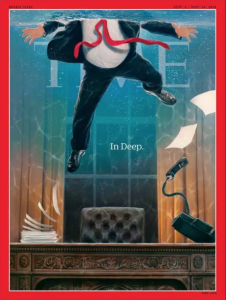In Nina Cried Power, Hozier calls out the names of several influential people in the realm of protest music. By doing this, paired with some lyrics that comment on the state of society both during the civil rights era and now, he creates an epic powerhouse of a song that Mavis Staples says is “Such a huge sound it could shake the Earth, filled with soul, passion, and fire, and it channels the struggles of some of my contemporaries. I’m telling you when you hear it, it’s going to drive you to rise up”.
In the first verse of this song, Hozier sings:
It’s not the waking, it’s the rising
It is the grounding of a foot uncompromising
It’s not forgoing of the lie
It’s not the opening of eyes
It’s not the waking, it’s the rising
This section can be seen as a comment on the general apathy that often surrounds political movements. A possible jab at current members of society who are “woke” but do nothing to aid in the fight against any sort of political injustice. When this was released in September of 2018, it hit the US streaming service at a time when Donald Trump was beginning to receive serious legal allegations against him in federal court. An interesting (maybe unintentional) parallel I found between these events was the cover of the Time magazine article and Hozier album art for the release, in which both parties are seen underwater. Hozier’s entire album, titled Wasteland, Baby!, is conceived as an apocalyptic collection of songs that mark, and celebrate the end of time. It is no coincidence that Nina Cried Power is the first track on this album, and that the comments on civil rights, both now and in the late 1900’s, are part of a larger collection of works that are commenting on the end of mankind.
Aside from comments on political stances via lyrics and the album as an entity, Hozier mentions a lot of civil rights activists in this song. Each one of their beliefs and views are representative of at least one aspect that Hozier wants to celebrate in this song and call attention, and action to. Some names that he mentions include: Nina Simone, Billie Holiday, Curtis Mayfield, Patti Smith, John Lennon, James Brown, B.B. King, Joni Mitchell, Pete Seeger, and more.
Nina Simone, the namesake of the song, is even, in a way, sampled in the song. The song directly aligns with her song Sinnerman, where she sings:
I cried, power
(Power to the Lord)
Power
(Power to the Lord)
Power
(Power to the Lord)
Simone’s song is an African American gospel song that talks about the judgement day, and the inability of a sinner to run from the mistakes he made. The song is in a way a warning to the “sinnerman” that they better change their ways before their time is up. The use of this reference and Nina’s name in Hozier’s song is not insignificant or unrelated in anyway. The entire album is about the end of the world, just like in the sinnerman. The time period has shifted, but the problems still remain. People are being mistreated, and those who are mistreating them is the audience that Hozier is trying to connect to. To tie it back to the first verse of lyrics we looked at, Hozier is commenting on the general lack of action and apathy that exists in todays political and social climate. Those who are not acting are equal to the sinnerman. Being a bystander and not speaking against something is often times just as bad as being the one doing the oppression. And their judgement day is coming. The call to action that Mavis Staples says is a hopeful one, that there is still time to rise and make some changes.


April 1, 2020 at 7:48 am
Jenn,
Listens 3 and 4 are moving in the right direction for your work — they are more nuanced than your prior two, and show you more thoroughly engaging with the song — and what a great song it is. Your discussion of the genre is very good, though I don’t think you need to say that Hozier’s “exploration into the genre may raise some flags” — there have always been white artists protesting with African Americans (Guthrie, Seeger, Dylan), and Mavis Staples especially has been collaborating with younger white male artists; her One True Vine (2013) album was produced by Jeff Tweedy of Wilco. So, no need to make that qualification. I do wish, however, you had brought in a discussion of the song’s chord progression and considered how that adds to your understanding of it, and I’d like you to do that in your podcast.
Listen 4 looks very nicely at the social criticism in the song and shows you have a clear understanding of what Hozier is trying to do.
Bill